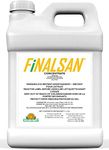We Use CookiesWe use cookies to enhance the security, performance,
functionality and for analytical and promotional activities. By continuing to browse this site you
are agreeing to our privacy policy
Best Weed Killers For Lawns
From leading brands and best sellers available on the web.#2

Neudorff
Finalsan Herbicidal Soap - 10 L
View Product
#3

VORAGA
5%OFF
ORTHO KILLEX Lawn Weed Killer, 1L Ready-to-Spray
View Product
#4

Roundup
Roundup Advanced Ready-to-use 1L
View Product
#5

WILSON
Wilson Wipeout Ultra 1-L
View Product
#6

Safer's
Safer's 04-5100CAN TopGun Weed Killer 1L Ready-to-Use Spray
View Product
#7

Killex
12%OFF
ORTHO KILLEX Lawn Weed Killer Concentrate, 1L
View Product
Buying Guide for the Best Weed Killers For Lawns
Choosing the right weed killer for your lawn can make a big difference in keeping your grass healthy and free from unwanted plants. The key is to match the product to your specific lawn type, the kinds of weeds you’re dealing with, and your personal preferences for application and safety. Understanding the main features of weed killers will help you make a choice that’s effective and safe for your yard, pets, and family.SelectivitySelectivity refers to whether a weed killer targets only weeds (selective) or kills all plants it touches (non-selective). This is important because using a non-selective product on your lawn can damage or kill your grass along with the weeds. Selective weed killers are designed to target common lawn weeds without harming the grass, making them ideal for most lawns. Non-selective weed killers are best for areas where you want to clear all vegetation, like driveways or patios. To pick the right one, consider if you want to treat just the weeds in your lawn or clear an area completely.
Weed Type CoverageWeed type coverage describes which kinds of weeds the product is effective against, such as broadleaf weeds (like dandelions and clover) or grassy weeds (like crabgrass). This matters because not all weed killers work on all types of weeds. Some products are broad-spectrum and target many weed types, while others are specialized. To choose the right one, identify the weeds in your lawn and select a product that specifically lists those weeds on its label.
Application MethodApplication method refers to how the weed killer is applied, such as ready-to-use sprays, concentrates that need mixing, or granular forms. This is important because it affects how easy the product is to use and how precisely you can target weeds. Ready-to-use sprays are convenient for spot treatments, concentrates are good for treating larger areas, and granules are often spread over the whole lawn. Choose the method that matches the size of your lawn and your comfort with mixing or spreading products.
Residual EffectResidual effect means how long the weed killer continues to work after application. Some products kill weeds on contact but don’t prevent new ones from growing, while others provide ongoing protection for weeks or months. This is important if you want to reduce the need for frequent reapplication. If you’re looking for long-term control, choose a product with a longer residual effect, but be aware that these may also affect new grass seed or other plants.
Safety for Pets and ChildrenSafety for pets and children indicates whether the product is safe to use in areas where kids or animals play. This is crucial if your lawn is a family or pet area. Some weed killers require a waiting period before the area is safe to use again, while others are formulated to be safer. Always check the label for safety instructions and choose a product that fits your household’s needs.
Lawn Type CompatibilityLawn type compatibility means whether the weed killer is safe for your specific type of grass, such as cool-season or warm-season varieties. Some products can damage certain grass types, so it’s important to match the weed killer to your lawn. Check your grass type and make sure the product is labeled as safe for it to avoid accidental damage.




